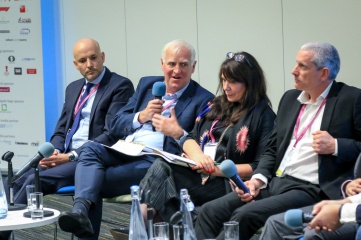In a keynote address, International Olympic Committee Vice President Prof. Dr. Ugur Erdener said:
“We – the rights holders, hosts organisers, International Federations and all stakeholders –all have to respond to and meet the new needs of the changing world. We must re-evaluate the content and formats of our major events to ensure that they are engaging and beneficial for future generations.
“As long as measures are taken to ensure their sustainability through creating greater value for hosts and partners alike, and by cooperating and collaborating with the hosts throughout the planning and delivery of the event, aligning with government policies to deliver long-term transformational change within society, the future of major events will continue to be a positive one.”
In his welcome address, Paul Bush OBE, Director of Events at VisitScotland said:
“Looking ahead, I believe there are three key areas that will have an influence on the future of major events. Co-hosting events across cities, regions or countries is an important trend for the future as it will allow for more sustainable impact by using existing infrastructure as well as developing those social and cultural benefits across a much greater geographical area.
“Digital integration will also play a big part in the future of how major events are presented. From augmented reality, live streaming to the availability of real-time data, all these tools are now at our fingertips to enhance the fan experience and drive greater engagement with an event.
“And finally, it will be about ensuring a 360-degree holistic model approach to the planning and delivery of events, ensuring they are enshrined in policy whether it be health, education, transport or sustainability.”
Speaking on the opening panel, Ansley O’Neal, Olympic Programme Commission Manager, International Olympic Committee said:
“One of the exciting things we are looking at in terms of how we put together the sports programme is not just the urbanization of sports, not just the way in which sports are delivered in the future, but how you continue to appeal to an audience all over the world when sports are becoming more topically relevant within different regions.
“We as a property are looking at a broader content perspective – really trying to drive what’s happening on the field but also outside the venues.”
Alban Dechelotte, Head of Sponsorships & Business Development EU Esport, Riot Games said: “We are the new kids on the block, the future is now for us. We are young, digital and international. 85 percent of our audience is below the age of 25.
“We are building the same governance as every federation; the only difference is that we own the sports, the leagues and the broadcast. For us the future is to go deeper, not broader; instead of trying to go global we go local; instead of trying to be agile we are trying to build the governance that will lead us for decades.”
Dimitri Kerkentzes, Deputy Secretary General, Bureau International des Expositions (BIE) said:
“The future for the Expo is really a question of being able to communicate the reasons why we want to have these events in these cities.
These are presence-based events – the only way to really experience it is to be present. That means a lot of infrastructure needs to be put in place, and we need to communicate to citizens why we are doing this. Are we just using the expo to catalyse it or are we seeing it as a benefit for the future of the region?”
Jon Dutton, Chief Executive, Rugby League World Cup 2021 said:
“The way we consume sport and entertainment is changing, therefore we have changed as organisers. We will stage our first ever Esports event during the World Cup to engage with Generation Z and millennials who wouldn’t normally engage with our tournament.
“Alongside the men’s competition we’ll run the women’s world cup, the wheelchair world cup and a masters tournament. And we will have a big cultural programme. We are going to deliver all this at a time when the world is changing in front of our eyes.”
Dr. Bridget McConnell CBE, Chief Executive, Glasgow Life said:
“Events, important in their own right, also have to be milestones in terms of the wider health, education, culture, sport agenda. Linking an event to other policies is a no-brainer – it helps the public understand why you are doing it."
Neil Carney, Project Director for the 2022 Commonwealth Games, Birmingham City Council said:
“When we look to the future, it’s about a sense of partnership between organising committees, rights holders, host cities and suppliers. They are all competing with one another, so how do we create a safe space for those natural tensions? Events like this really do help with that – there are no other forums where we can have these conversations.”
David de Behr, Head of Sales Major Events, Aggreko Event Services said:
“Our role is to give federations and associations an alternative, to maybe change the concept. The ones which are in trouble are the multi-sports events. We have a lot of solutions to make them more sustainable, but we need to be part of the vision.”
Other speakers included top level representatives of Formula 1, National Olympic Committees, European Olympic Committees, Auckland, Victoria, UEFA, OECD, Eurovision Song Contest, GL events, AFL Architects, EBU, Cirque du Soleil, Coventry City Council, DF Concerts & Events, Rotterdam Ahoy, European Arenas Association, International SAMBO Federation, Nitro Circus, Red Bull Air Race, FIBA, UK Sport, World Archery, innsbruck-tirol sports, International Association of Event Hosts, London & Partners, Brno City and many more.


